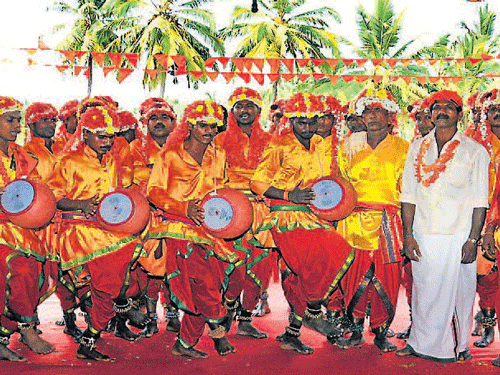
While party workers of different parties were busy campaigning for their respective candidates in City on Sunday, Kudubis in rural areas of Port City were busy celebrating ‘Holi,’ one of the biggest festivals of Kudubi community, also known as Kudumbi, Kudmi or Kunbi.
Clad with colourful dresses and decorating their heads with wild flowers, the men in the community danced to the tunes of folk songs (sung by themselves) while a few in the group beat ‘gummat’ (a percussion instrument made of clay). Most of the folk songs narrate a few pieces from Ramayana.
Interestingly, the celebrations mark the end of the festival which begins on the day of Holi (full moon day in March (March 17 in this case) and the celebrations are held either on 5th, 7th, 9th or 11th day after Holi (odd numbers) which is decided by the ward committee members.
Speaking to Deccan Herald, community leader Gopala Gowda said that there are 26 wards in Dakshina Kannada district with about 20,000 population of Kudubis.
The ceremony (ritual) which began at around 1.30 pm on Sunday, continues till the wee hours of next day. Normally the celebrations are held in Gurikar’s (ward head) house or a temple. On Sunday, the celebrations were held in 4 wards in Yedapadav region, namely, Kannori, Kannori hills, Payyarabettu and Kindelu.
While the men (selected few) sing folk songs accompanied with Gummat, the women and children enjoy the celebrations. As the sun set, the second phase of celebrations began with ‘Kolaata’ (stick dance) by the men.
The celebrations conclude with an unmarried youth ‘crossing the bridge’ to safely bring back ‘Seetha’ from Lanka, who was kidnapped by ‘Ravana’. At the end, the artistes remove flowers (covering their heads) and put it in turmeric water.
Between the full moon day and the day of celebrations, the ‘Holi’ dancers visit all houses in their ward and sing folk songs.
“Though every troupe used to visit every house of the community members in earlier days and receive rewards either in cash or kind (grains), these days the visits and collection is restricted to only few houses, espeically in the case of offerings (Harake),” says Gowda.
Meanwhile, Advocate Vijay Gowda, another member of the community from Kannori in Yedapadav, said no member of the community consumes non-veg or alcohol during the celebrations.
It is believed that Kudubis migrated once upon a time from Goa towards Dakshina Kannada / Udupi (erstwhile South Canara) to avoid religious conversion and settled here permanently.